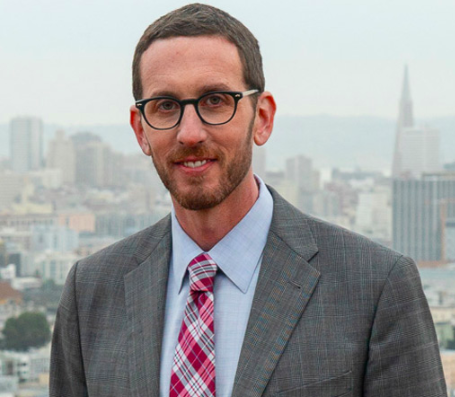Incumbent state Senator Scott Wiener and his challenger, Jackie Fielder, have raised almost the same amount of money between February and June, campaign finance reports show.
That’s remarkable: Wiener is one of the most prolific fundraisers in San Francisco, and has the formidable power of incumbency. Fielder has never run for public office before.
Yet Fielder in this period raised $215,000 and Wiener raised $265,000.

Of course, Wiener is still way, way ahead in the money totals – he raised so much money before the March primary that he still has more than $800,000 in the bank.
But Fielder’s fundraising is significant – and the reports show a whole lot about how this race is shaping up.
Put simply: Fielder reported some 1,800 unique donors. Almost all of them gave small amounts of money, and most – more than 1,200 — gave less than $100.
Wiener listed 426 donors who together gave $257,000. (Another $8,000, he reported, were donors who gave less than $100 and don’t have to be listed in the state reports.)
Fielder received only two donations this period from organizations or PACs — $1,000 from the San Francisco Teachers Union, which has endorsed her, and $1,500 from the Three Affiliated Tribes, which is her tribe.

The majority of Wiener’s money came from corporations, PACs, and real-estate.
I generally hate the idea that the amount of money someone can raise defines their campaign; this is a corrupt system. But in recent years, candidates like Bernie Sanders have shown that a whole lot of people putting up a little money can change the direction of politics.
And given the system we are living with, the patterns of fundraising tell a powerful story.
In this case, Fielder has shown significant grassroots support, and Wiener has shown that he has the support of big interest groups, particularly real estate.
It’s a bit hard to track and identify exactly where real-estate money comes from, since a lot of people in the industry don’t identify themselves as brokers, landlords, investors, or developers. Some lawyers who do almost entirely landlord works are listed as “attorney” in these sorts of campaign finance reports. Some big landlords list themselves as “retired.”
Then there’s the tricky money trail. Wiener, for example, got $4,700 from something called the Bay Area Legislative Leaders PAC. You look that up on the Secretary of State website and you find it gets a lot of real-estate money.
The records also show that this particular PAC got $7,800 from the prison guard’s union, although Wiener says he has accepted Fielder’s challenge to accept no money from law-enforcement groups. You can’t say that none of the money Wiener got from this PAC came from the prison guards, or real estate — or Lyft, which gave $25,000 — it’s all fungible money.
But just looking at the money that comes directly from real-estate companies, landlords, developers, or their industry groups, Wiener received $48,000 in this period.
Campaign donations come in several types. Lots of people who are neither rich nor powerful simply give small amounts of money to candidates who share their deep political beliefs. That’s how Bernie Sanders raised so much money. It also happens on the local level, and sometimes at the state level.
Then there are the lobbyists and PACs and corporations and special interests, who give money (mostly on the state and federal level, since corporate contributions are banned in SF races) so they can buy access to politicians, and in many cases, so they can influence the outcome of legislation.
There’s a reason it’s almost impossible to get pro-tenant bills passed in the California Legislature; the real-estate industry pours tens of millions into Assembly and Senate campaigns. Same goes for Big Oil, Big Pharma, and a lot of other industries.
Then there are the individuals and groups – and we see this a lot in SF politics – who support candidates because they believe those candidates will be the most likely to promote their financial and political interests.
I don’t think the real-estate industry thinks Wiener will vote with them because they gave him money. I think the real-estate industry gives him money because they know he’s likely to vote with them anyway and they want him in office.
Fielder has a few large donors, too – a local property manager named Heidi Chiao gave $9,150 cumulatively in the primary and this race, and some tech workers (although no tech execs) put up larger sums. That money, Fielder told me, is mostly from the Democratic Socialists of America network.
In fact, with Fielder DSA is once again showing its organizing and fundraising clout, which is becoming an increasingly important part of San Francisco politics.
Fielder told me that “our fundraising shows that people are desperate for change.” She said that “our program of taxing billionaires to fund the schools and social programs is getting attention.”
Fielder’s campaign is still a longshot – unseating an incumbent in the California Legislature is really, really difficult. But it’s an unusual year; we have no idea at this point how much turnout will increase with everyone getting a vote-by-mail ballot (or decrease with COVID keeping people who don’t want to vote by mail from the polling places).
A couple of interesting items from the Wiener report. He lists a $2,000 contribution from Les Natali, who owned a Castro bar called Badlands. The place became infamous in 2005 when a Human Rights Commission investigation concluded that Natali actively discriminated against African Americans. Picketers (including Scott Wiener) marched for weeks outside the bar.
Badlands just closed for good.
I asked Wiener about that contribution – I mean, he’s got $800,000 in the bank, he doesn’t need $2,000 from Les Natali – but he hasn’t responded.
Also interesting: Although Wiener has voted in favor of legislation that mandates Uber and Lyft treat their drivers as employees – and Uber and Lyft have refused and are now spending more than $90 million to try to overturn that legislation – Wiener seems to have no problem patronizing Uber. His reports show he often takes Ubers to campaign events.
There are other traditional taxi companies out there whose drivers desperately need the work. But Wiener’s taking Uber.






